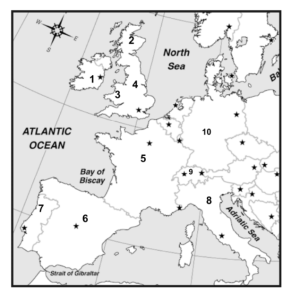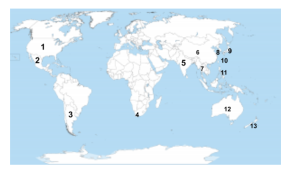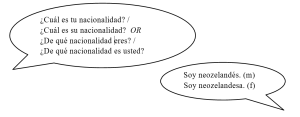25
¿De dónde eres?

Los países
As with English, country names require a capital letter.
A. Los países europeos
| Alemania | Gales | Escocia | Suiza | España |
| Francia | Inglaterra | Irlanda | Italia | Portugal |
B. Otros países del mundo
| Australia | Nueva Zelanda | Sudáfrica | India | Corea |
| Argentina | Los Estados Unidos | México | Japón | China |
| Tailandia | Las Filipinas | Irán | Iraq | Taiwán |
Exercises A
Ej. 1 Escribe los nombres de los países europeos en el mapa.

Ej 2 Escribe los nombres de los países en el mapa.

La nacionalidad

Unlike English, nationalities in Spanish do not require a capital letter.
Grammar A
- Nationalities agree with the person they describe.
- If the masculine nationality ends in -o, change the –o to –a to form the feminine form.
australiano → australiana
italiano → italiana
- If the masculine nationality ends in a consonant, add–a to form the feminine form. You need to take off the written accent.
inglés → inglesa
alemán → alemana
español → española
- If the masculine nationality ends in other vowels, the feminine form remains unchanged:
estadounidense → estadounidense
iraquí → iraquí
- To make nationalities plural, as with other adjectives, add ‘s’ if it ends in a vowel, and ‘es’ if it ends in a consonant.
australiano →australianos, australiana → australianas, inglesa → inglesas, española → españolas
inglés → ingleses, español →españoles, francés → franceses (remove accents)
Singular Plural
| yo | soy | I am | nosotros | somos | we are | ||||
| tú | eres | you are (informal) | vosotros | sois | you all are (informal) | ||||
| él/ella | es | he/she is | ellos/ellas | son | they are | ||||
| usted | es | you are (formal) | ustedes | son | you all are (formal) |
NB: de = from –> Soy de = I am from
This is the first of a series of irregular verbs that we will learn. It is important to learn verbs, so that we can talk about people other than ourselves. This verb needs to be memorised, as do the different pronouns:
| yo | I |
| tú | you (singular, informal) |
| él | he |
| ella | she |
| usted | you (singular, formal) |
| nosotros/nosotras | we |
| vosotros/vosotras | all of you (informal) |
| ellos/ellas | they |
| ustedes | all of you (formal) |
Exercises B
Ej. 3 Escribe la forma femenina de cada nacionalidad.
| País | Nacionalidad – masculina | Nacionalidad – femenina |
| Alemania | alemán | |
| Argentina | argentino | |
| Australia | australiano | |
| China | chino | |
| Corea | coreano | |
| Escocia | escocés | |
| España | español | |
| Los Estados Unidos | estadounidense | |
| Francia | francés | |
| Gales | galés | |
| Inglaterra | inglés | |
| India | indio | |
| Iraq | iraquí | |
| Irlanda | irlandés | |
| Italia | italiano | |
| Japón | japonés | |
| México | mexicano | |
| Nueva Zelanda | neozelandés | |
| Sudáfrica |
sudafricano | |
| Taiwán | taiwanés |
Ej. 4 Lee y escribe la información.
1. ¡Hola! Me llamo Mariana. Soy española. Soy de Alicante, en España.
2. Soy inglés. Me llamo Robert. Soy de Londres
3. Soy mexicano. Me llamo Alfredo. Soy de Oaxaca.
4. Me llamo Rosa. Soy italiana Soy de Roma en Italia.
5. ¡Hola! ¿Qué tal? Me llamo Sara. Soy sudafricana y soy de Cape Town.
6. Me llamo Lianne. Soy china. Soy de Shanghai.
7. Me llamo Meha. Soy de India. Soy india.
| Nombre | País | Nacionalidad |
| Mariana | España | española |
Ej. 5 Escucha la cinta y empareja las frases correctamente. Mira el ejemplo. (A1D1T27)
| 1 | Me llamo Pablo. | a | Soy francés |
| 2 | Me llamo Adriana. | b | Soy galés |
| 3 | Me llamo David | c | Soy estadounidense |
| 4 | Me llamo Isabel | d | Soy francesa. |
| 5 | Mi nombre es Alain | e | Soy español. |
| 6 | Me llamo Elisabet. | f | Soy jamaicana. |
| 7 | Me llamo Aadil. | g | Soy paquistaní. |
| 8 | Me llamo Sharon. | h | Soy española. |
Ej 6 Traduce estas frases en español.
- Paula: I am French
- María y Elena: We are Spanish
- Ester and Felipe are Mexican.
- Are you Japanese, Kenji?
- Are you all from Germany?
- Liana is from Korea.
- They are from England.
Ej. 7 Escribe las palabras apropiadas en los globos y luego escucha la cinta para ver si son correctas.(A1D1T28)
